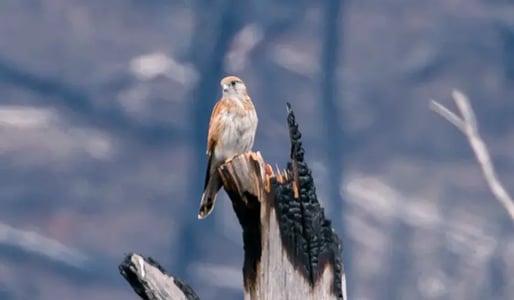Bushfires
and
Birds
- Home
- Wildlife information
- General Information
- Bushfires and Birds
Bushfires are devastating our wildlife and their habitats. Some birds manage to escape the heat and flames but will be displaced and starving. You may be seeing more birds in your gardens and local areas.
Keep dogs and cats locked up as birds will be weak and vulnerable.

Water
Provide clean fresh drinking water in shallow containers. These can be on ground level and higher up next to tree cover in the shade. Place a rock or heavy stick to allow smaller birds, lizards and insects to easily access the water and not become trapped. Clean the containers and refill with fresh water every day or more frequently if needed.
Helping the Habitat
All birds eat insects. Compost heaps and piles of damp leaf litter will encourage a variety of insects.
Keep a wild weedy area in your garden. For the time being, don't mow seeding grass or dandelion flowers. Water certain corners of your garden to encourage plant growth and insects (use grey water if you are on water restrictions).
Propagate/buy native trees to plant! Some local Councils offer native trees and shrubs to residents for free, so check with them before you purchase anything.
Feeding the Birds
Food can be provided for the short term during the most critical period until the natural environment begins to regenerate.
Incorrect diets can be harmful for our native bird species and can cause long term health problems and increase the spread of diseases. It will take some extra time and cost, but to really help the birds we must do what is best for them.
Unfortunately, there will be feral species also competing for food, such as rates. We don't want a population explosion of feral species by leaving uneaten food about. It is also important the birds are not eating spoiled or rotten foods. Therefore, please remove all uneaten food at the end of the day and wash food containers thoroughly.
What Food?
- Good quality mixed seed, both parrot and budgie mix
- Chopped fresh fruit - preferably berries/grapes. (avoid sweet mushy fruit such as mango and melon)
- Defrosted peas and corn
- Small pieces of lean meat when carnivorous birds are about (not mince)
- Meal worms (available at pet shops)
- Commercial bird food products ie Vetafarm Insecta Pro or Wombaroo Insectivore, prepared according to manufacturer's insutructions and replaced regularly
- Parrot pellets
- Dry honeyeater and lorikeet food
- Honeyeater and lorikeet wet mixes, prepared according to manufacturer's instructions and replace regularly as they will sour and ferment.
Provide food in clean dishes that can be cleaned daily and removed in the evening.Feed early in the morning before the weather gets too warm.
All uneaten food must be removed each evening as -
- meat will rot and attract bacterial diseases
- uneaten seed will sprout after rain and introduce non-native weeds
- feral animals such as rats and mice will be attracted

Other things you can do to help
Countless large old trees have been destroyed, along with their natural nest hollows. Erect nest boxes for all types of birds!
Nest boxes are fairly easily constructed at home or bought at your local Men’s Shed or purchased online. Below are some helpful links: